10 conclusions from Opening Weekend 2022
Jumbo-Visma emerge as a force, QuickStep falter, Sagan suffers, Russian invasion of Ukraine not forgotten
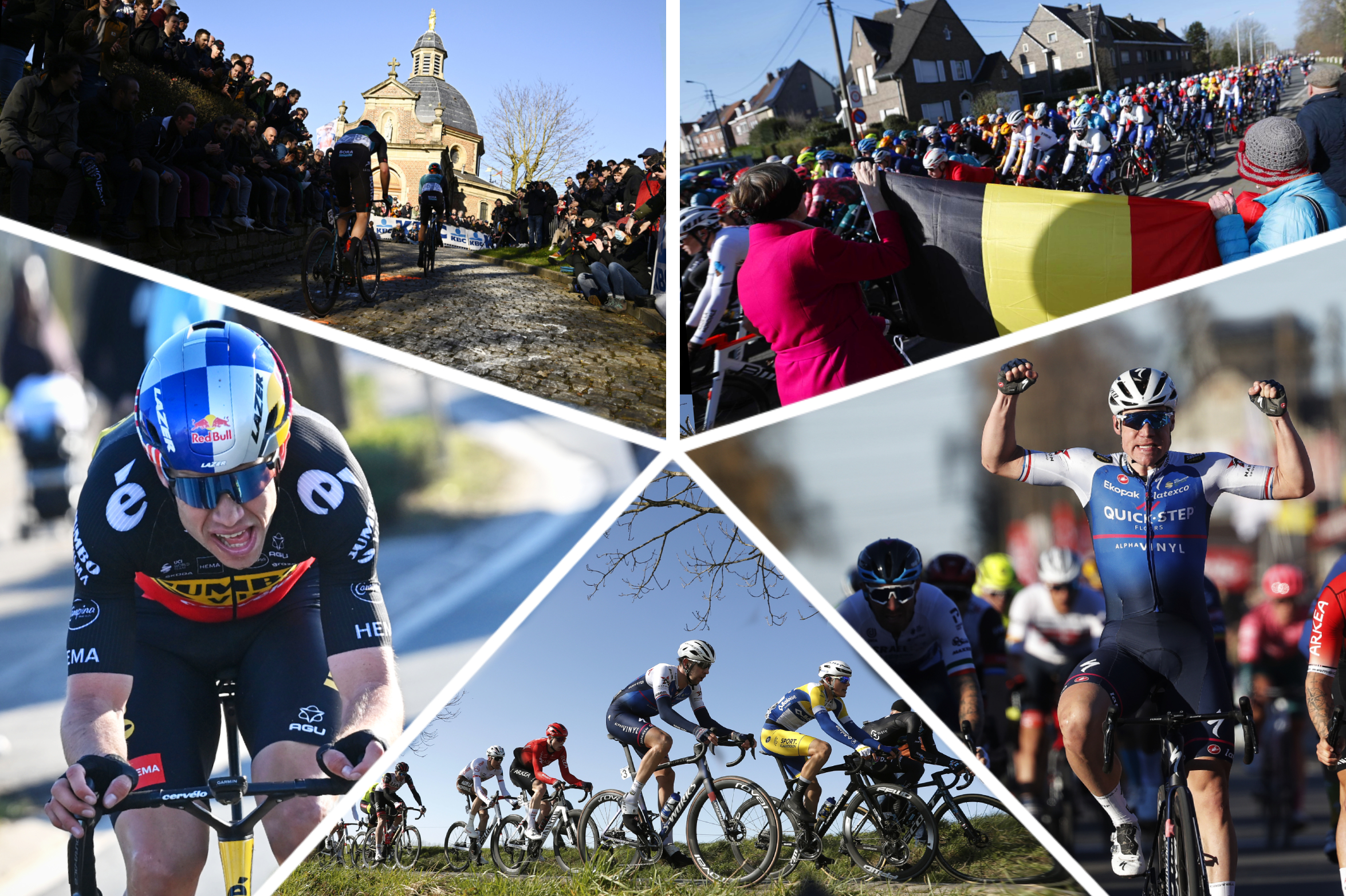
Omloop Het Nieuwsblad and Kuurne-Brussel-Kuurne raised the stakes and set the tone for the Spring Classics to come in the traditional ‘Opening Weekend’ in Belgium.
Wout van Aert (Jumbo-Visma) showcased his strength with a superlative solo victory at Omloop Het Nieuwsblad, while Fabio Jakobsen spared QuickStep-AlphaVinyl’s blushes with a sprint victory in a breathtakingly dramatic finale in Kuurne.
As ever, fortunes of either shade come with the same caveat at Opening Weekend. Failure to hit the mark is tempered by the prospect of bigger prizes to fight for down the line, while success will likewise mean little if not backed up during the main spring swing.
Still, the Opening Weekend is the perfect place to start when it comes to the narratives that will be unfolding over the next few weeks.
Fresh from their first trip to Belgium of the 2022 season, Cyclingnews’ reporters Patrick Fletcher and Daniel Ostanek offer their key takeaways from the weekend’s racing.
Jumbo-Visma are now a leading Classics force
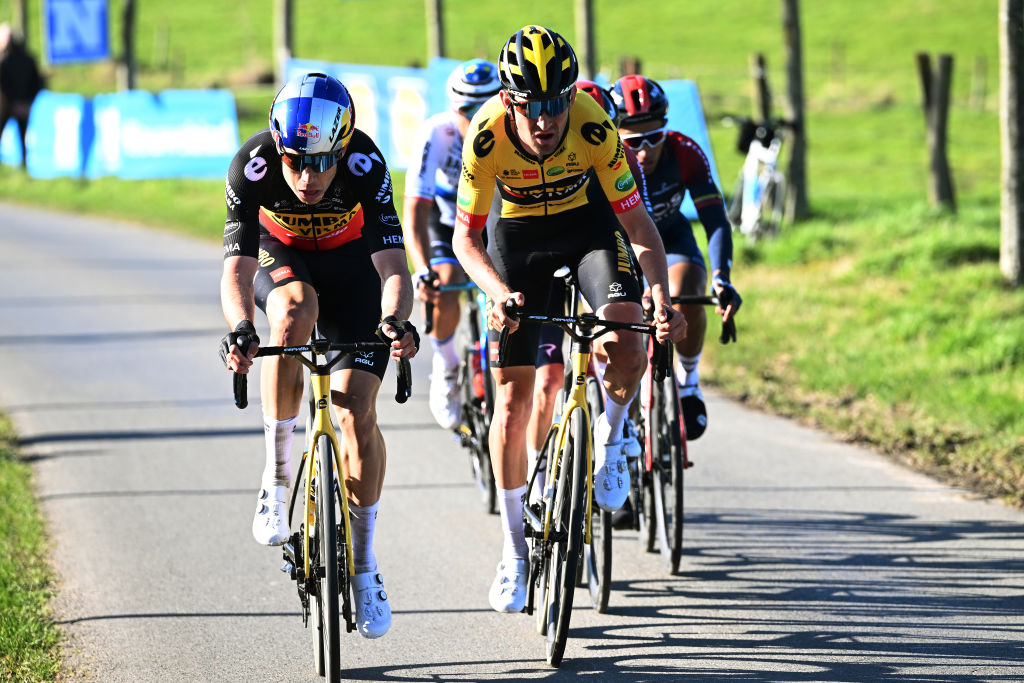
Wout van Aert won Omloop Het Nieuwsblad alone, but we already knew he could do that. What we didn’t know was that his team as a whole would dominate and dictate how the race played out.
Jumbo-Visma’s activity in the transfer market suggested a move in that direction, with Tiesj Benoot, Christophe Laporte, and Tosh Van der Sande all drafted in to address a situation in which the Belgian champion was too often left on his own last spring in key moments of the biggest races.
Get The Leadout Newsletter
The latest race content, interviews, features, reviews and expert buying guides, direct to your inbox!
Jumbo-Visma was stronger than ever and yet, not even they would have expected such an instant impact at Opening Weekend.
Benoot was instrumental on both days and was described by director Maarten Wynants as “the missing link”. On Saturday, he opened up the race with a vicious acceleration on the Berendries and then put Van Aert in the box seat by going solo from the select group ahead of the Muur van Geraardsbergen.
On Sunday, he was again attacking from range, helping to form the key 17-man move on the Trieu alongside Laporte and Nathan Van Hooydonck. It was interesting that Pidcock revealed to Cyclingnews that Benoot ‘took him out of the break’ by letting the wheel go. Self-sacrifice, but intelligent thinking, as the move then progressed more cohesively in Pidcock’s absence and Laporte almost went for the win from the last trio standing.
Laporte’s ride should be given its due. He was described by Wynants as the ‘strongest of the day’ and after just one race day already looks like an inspired signing. As for Van Hooydonck, he showed flashes last spring – notably at Gent-Wevelgem – but put in two solid and influential rides this weekend, while an injury-free Mike Teunissen might just feel like a new signing himself.
Had Laporte won on Sunday, it would have been an incredible double for the Dutch team, but the message was sent out nonetheless. Jumbo-Visma are now a Classics force to be reckoned with. (PF)
A game of two halves for QuickStep-AlphaVinyl
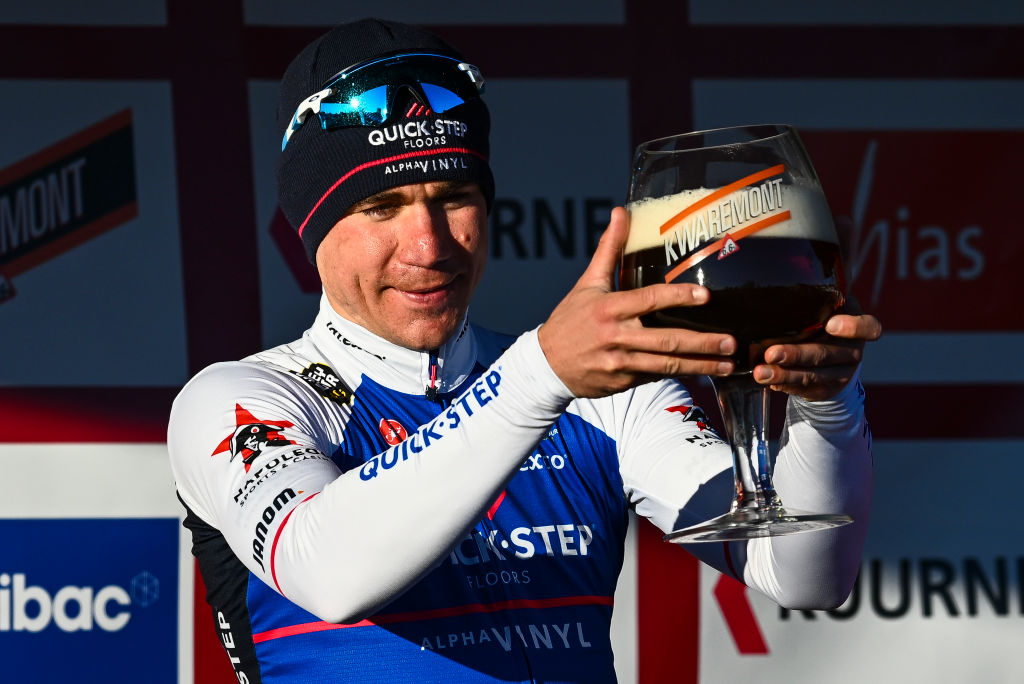
To borrow a cliché from the football world, the Opening Weekend was a game of two halves for QuickStep-AlphaVinyl.
The Belgian squad, which had won an unmatchable 12 races there in the previous 20 years, started off with an anonymous showing at Omloop, with Florian Sénéchal their only finisher in the top 60 in ninth place.
Fabio Jakobsen, who linked up with the team for Kuurne, turned things around at the death on Sunday, sprinting to his fifth win of year after QuickStep had burned through his teammates in the nail-biting chase for the breakaway.
The win came after boss Patrick Lefevere had visited the team at their hotel on Saturday evening, doling out some choice words in his thick West-Vlaams dialect, according to Jakobsen. Whether that did the trick for Sunday, or whether the turnaround was more down to the arrival of the most in-form sprinter in the peloton remains to be seen. But improvements need to be made ahead of the remainder of the cobbled season.
"The conclusion from the weekend is that things have to get better," said Yves Lampaert afterwards. "We can be content with one win in two races, but we still have to grow. Our team is not yet at full strength."
Lefevere was more positive.
"Omloop was bad, Kuurne was good," was his simple post-weekend breakdown.
"It seems like, for some people, Kuurne was our first achievement, but it was already our 11th victory of the season. After the Opening Weekend we always take stock, and with this win, we're off to a good start." (DO)
Fans back but atmosphere still stifled
‘Welcome back’ was the message of the Opening Weekend.
After two years of being told to stay at home, fans were ushered back to their beloved bike racing in Belgium. And yet, despite the buzz in Gent’s 't Kuipke velodrome on Saturday morning for the pre-race team presentation, widespread restrictions remained and the wave of ongoing COVID-19 infection in the peloton was a reminder that bike racing is far from out of the pandemic.
Gent on the morning of Omloop Het Nieuwsblad is one of the greatest places to be in bike racing. The sense of occasion and anticipation are electric, and that comes from the fans. Likewise, the cobbles and climbs Flemish Ardennes lose some of their magic when not lined with spectators.
The weekend was a halfway house. Fans were back in the Kuipke but only in the pit and not in the stands, as attendance was limited to a pre-registered 4,000. Outside, the huge hanger that houses the velodrome as well as team buses on the morning of the Omloop, rang hollow, cordoned off from fans (and media). It was the same again in Kuurne.
The way normal people can get so close to the stars of the sport is one of the special things about cycling and, although the roads were well lined, that intimacy is not yet back.
Belgium’s COVID-19 alert level is still set at amber but it’s hoped it will soon be lowered and that perhaps things can open up properly for the main Spring Classics period. If so, the Tour of Flanders could be quite the occasion. (PF)
Is Sagan warming up for spring or in terminal decline?
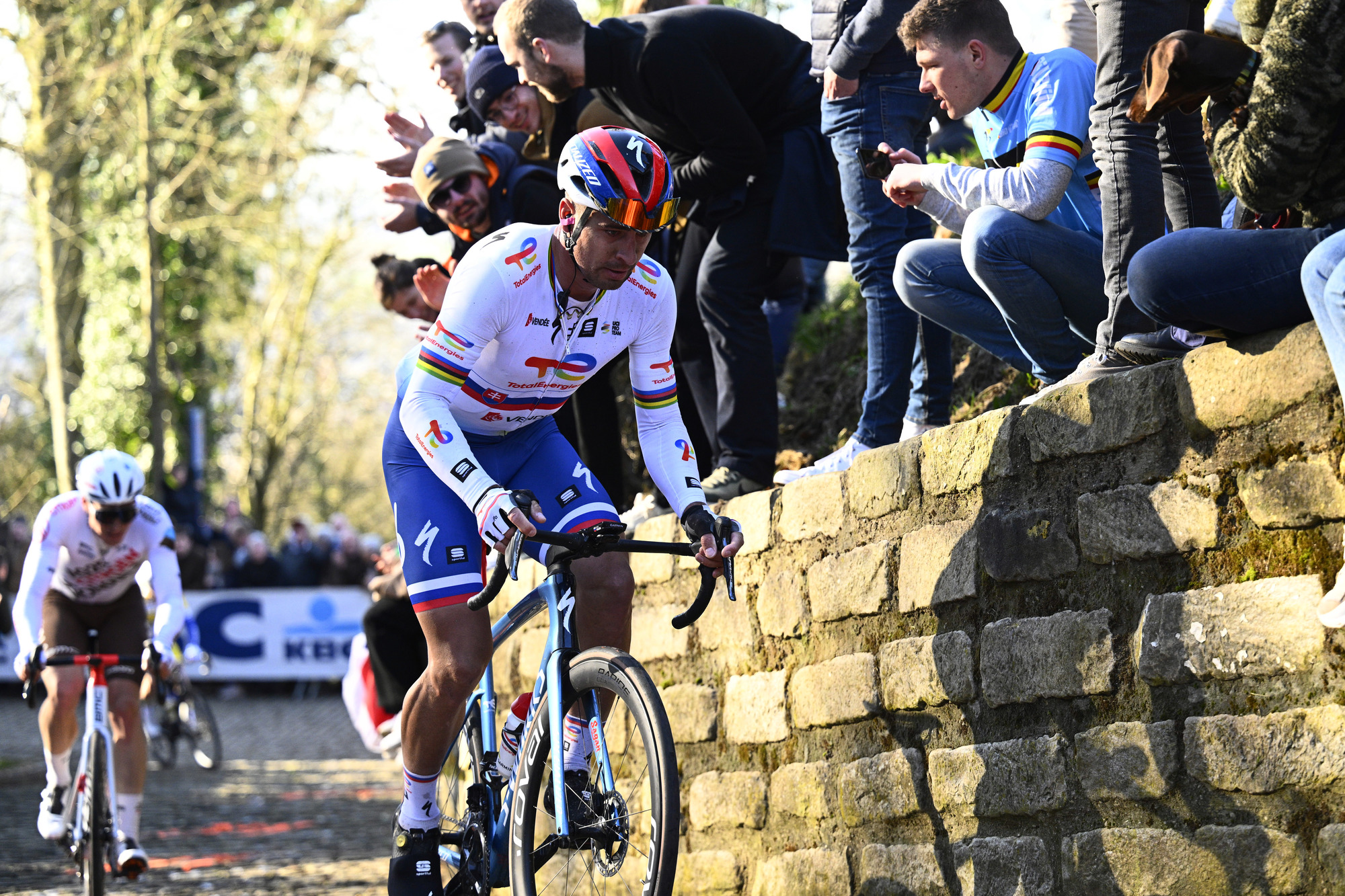
It's far too early to judge the transfer of three-time world champion Peter Sagan to French squad TotalEnergies, but the first returns this weekend were nothing to shout about.
The Slovakian, who has won Kuurne before and also twice finished second at Omloop, was nowhere close to his best this time around, finishing 117th at the former and 98th at the latter. On Saturday, he dropped from the peloton 30 kilometres out, while on Sunday he finished almost 10 minutes down.
Here, the major caveat is that Sagan's pre-season was disrupted by a COVID-19 infection and the subsequent loss of training time. That was back at the start of January, though, and given that Kuurne runner-up Caleb Ewan tested positive for the virus just over three weeks ago, it seems tough to justify as an excuse.
At this point, debate among fans over Sagan's decline or lack thereof has raged for several years. The wins and top results are less plentiful than they once were, that is impossible to deny, but it remains to be seen whether Sagan's Opening Weekend showing is the continuation of a decline or simply a weekend of testing and training ahead of bigger aims like Milan-San Remo, the Tour of Flanders, and Paris-Roubaix. (DO)
The future is bright at Ineos
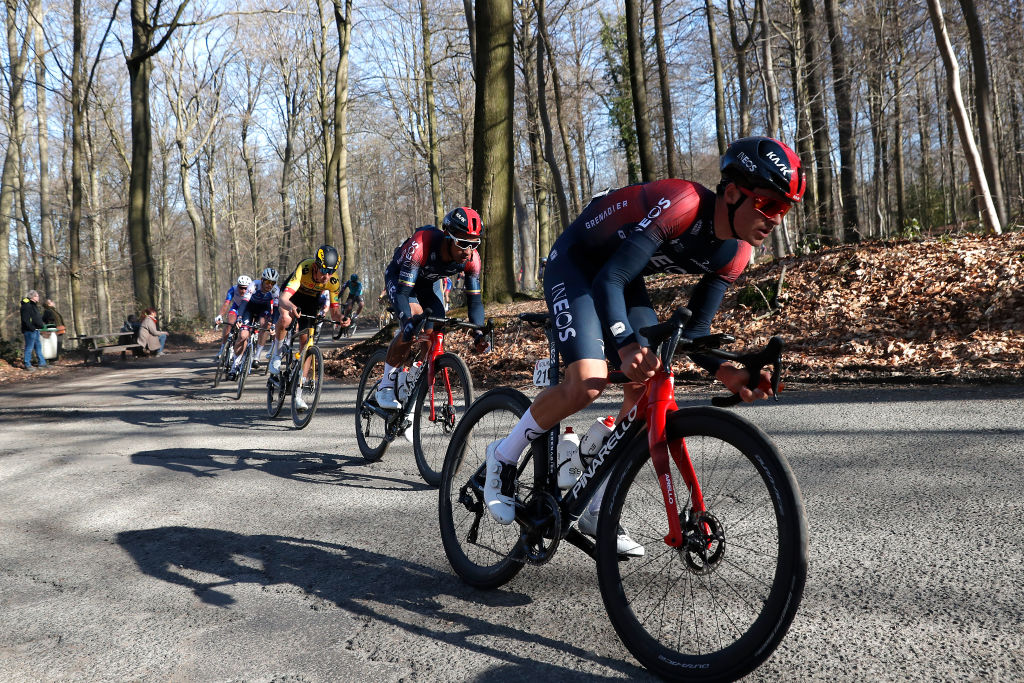
In a similar vein to our opening conclusion, Ineos Grenadiers have a superstar leader but they perhaps stood out most as a collective.
With their top placings being 18th on Saturday and 29th on Sunday, they are hardly on the level of Jumbo-Visma but nevertheless punched above their weight – and their age bracket. Taking out Cameron Wurf on Saturday and Ben Swift at both races, the average age of the squad was scarcely 22, with three riders making their cobbled debuts and the ‘leaders’ only having a year’s extra experience in these races.
Tom Pidcock was the leading light but let himself down slightly with a few mistakes, which he fully and honestly owned. With everything having seemed to come so effortlessly so far in his career, it was probably refreshing for mere mortals to discover there are certain ropes he still has to learn.
Instead, Narváez was arguably Ineos’ man of the weekend. He joined forces with Pidcock in long-range breaks in both races and came a couple of hundred metres from bagging a podium in Kuurne. Coming 12 months after attacking with Mathieu van der Poel 85km out and lasting until the final two kilometres, the progression was clear and the Ecuadorian has a bright future on the cobbles.
What stood out over individual performances, however, was the collective effort. The spirit at the Ineos bus after Kuurne was sky high and it wasn’t down to results but the way they raced. They all contributed to take Kuurne by the horns from 80km out and they ultimately shaped the race.
“They’re not intimidated. They get stuck in,” Ben Swift, the father figure of the group, said. “The way we’re racing is quite refreshing for this team.”
Ineos have enjoyed success at the Classics over the years but have never embraced them in the same way they have the Grand Tours. That looks to be changing now. This weekend was not a one-off case of filling gaps with kids, but the start of a construction process – a Classics project with Pidcock at the heart. As the 22-year-old said himself: “This has been a really good sign for the future Classics, for this year and years beyond.”
Van der Poel absent, but that didn't detract from the spectacle

The most notable name missing from the action at the Opening Weekend was Alpecin-Fenix superstar Mathieu van der Poel. The Dutchman, currently out of action for an indefinite period due to his back injury, has yet to race on the road this season and a return date during the cobbled Classics is as yet unknown.
He hasn't yet taken on either Omloop or Kuurne during his career, but one could argue that his presence was missed on Saturday. Most post-race analysis in Belgium centred on Wout van Aert's dominance after the Belgian soloed away on the Bosberg to win by 22 seconds 13 kilometres later.
Van Aert and Van der Poel have a long and intertwined history, with their latest chapter of their battles on the road coming late last year at the Worlds and at Paris-Roubaix. Few will argue that the racing at Omloop would not have been enhanced by the pair going head-to-head once more – another battle and perhaps a rider who could have matched Van Aert.
In the end, it wasn't to be, though, and Van der Poel fans will have to keep waiting for the Dutchman to get back to the action later this year. What was left in his absence was a supreme display from his long-time rival, one that – like Fabio Jakobsen's win on Sunday – was an entirely predictable outcome to an action-filled afternoon. (DO)
Colbrelli and Bahrain will have their say this spring
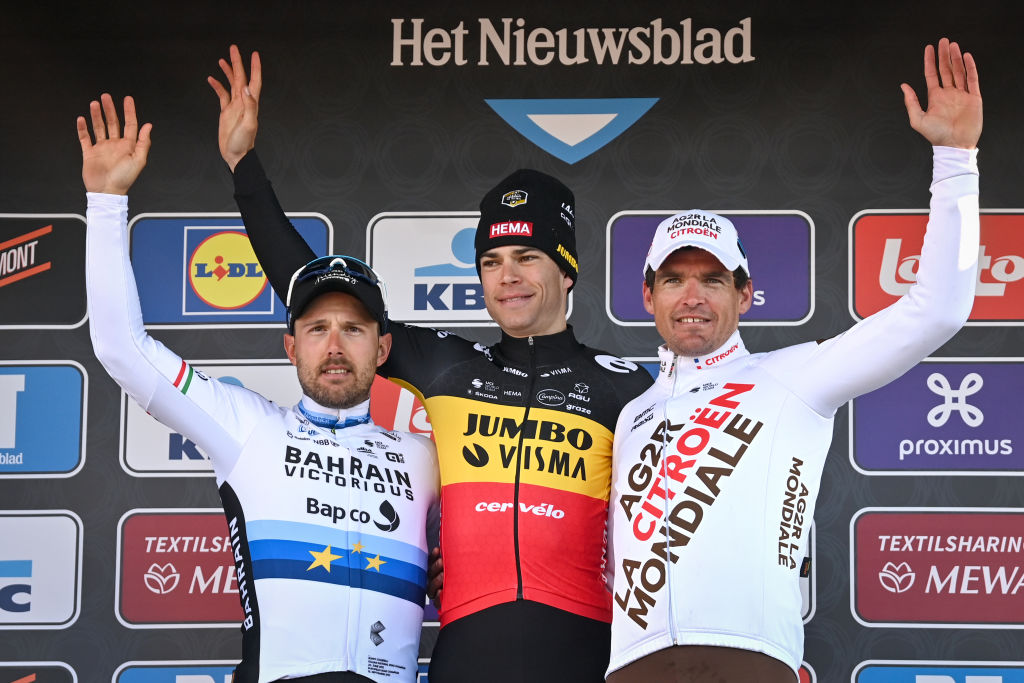
Sonny Colbrelli had been knocking on the door at the cobbled Classics for a few years but the 2021 season proved to be a major breakthrough in the Italian’s career. He put in some staggering performances all year, culminating in his storming Paris-Roubaix victory. That cobblestone trophy seemed to shift his status overnight, and he has carried it into the new season.
Colbrelli did not win either race but did finish second at the Omloop, before sacrificing himself at Kuurne as Bahrain Victorious arguably backed the wrong horse.
Still, his acceleration over the Berendries was noted by former Lotto Soudal boss Marc Sergeant as “one of the best efforts of the entire weekend”. Benoot had kicked off the hostilities with his leader Van Aert, and the only riders able to follow were the Ineos duo of Tom Pidcock and Jhonatan Narváez. That was until Colbrelli came roaring over the top. His lateness was clearly due to being out of position rather than anything else, as he produced a remarkable solo burst to zip across what he thought could be the day’s decisive attack.
Later on, he was up in the first few over the Muur van Geraardsbergen in another display of strength, before his teammates looked to set him up for a sprint. It turned out to be for second place, but he still packed his usual fast finish.
The following day, Colbrelli was less active on the climbs and more so on the flat, as Bahrain chose to work to bring about a bunch sprint for Phil Bauhaus. In the end, the German could only manage 13th, and there was a legitimate question to be asked about whether Colbrelli was the better card, either in an attacking sense or even in a sprint.
Still, Bahrain Victorious did enough at the Omloop to come away with heads held high. Mohoric was an attacking presence, as always, Fred Wright also made the selection over the Muur and Bosberg, and Heinrich Haussler was never far from the front.
In Colbrelli they have one of the top individuals for the spring – not on the level of Van Aert but definitely in the band below. (PF)
No champagne but progress and hope at Lotto Soudal
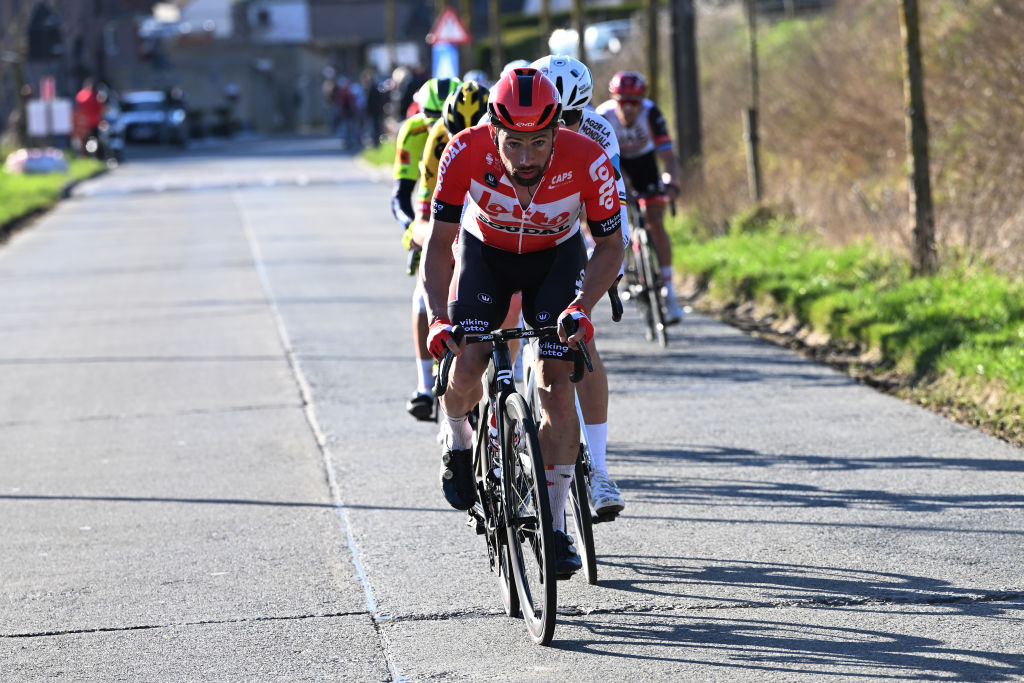
To say that the Belgian squad's recent history at the Opening Weekend has been disappointing is something of an understatement, but this time around the two races brought reason for optimism ahead of the main cobbled Classics campaign.
The team has never won an edition of Omloop Het Nieuwsblad and hasn't won at Kuurne-Brussel-Kuurne since Andrei Tchmil completed a Lotto triple at the race back in 2000. That didn't change this year, but Caleb Ewan delivered their first Kuurne podium since 2003, while on Saturday Victor Campenaerts finished fifth having battled through two punctures, a crash, and a bike change.
Ewan's result, a narrow loss to Fabio Jakobsen, came with a caveat too, with the Australian's build-up to Classics season disrupted by a COVID-19 positive at the start of February. And bear in mind that Lotto's weekend achievements came in spite of Tim Wellens being out sick and Philippe Gilbert and Paris-Roubaix runner-up Florian Vermeersch not yet being at 100 per cent form.
"I think we've had a very good Opening Weekend," said team boss John Lelangue. "I give the team eight out of 10. We helped determine the races."
They may not have another victory to add to their strong early season haul of seven – as they chase UCI points to stay in the WorldTour – but there's reason for great optimism at Lotto Soudal.
With a strong group of Classics riders and clear progress being made, the team should have a better chance than ever to break their Classics win drought which stretches all the way back to Nico Mattan's 2003 Gent-Wevelgem triumph. (DO)
Horses for courses
Omloop Het Nieuwsblad and Kuurne-Brussel-Kuurne have both suffered from slight crises of identity in recent years. The Omloop was remodelled in 2018 to revive the old Tour of Flanders course, while Kuurne seems to perennially announce a new area of difficulty that will supposedly make things even more difficult for the sprinters.
After last year’s unusual big bunch sprint, this year felt like a big moment for the Omloop, especially with forecasts of a third headwind finale in five years. In the end, there was a solo winner, but the race was hardly split to pieces. 20 riders arrived in the group behind Van Aert and there were 60 in the one that followed a minute later.
The conditions probably played a part. The headwind wasn’t even that strong, and more generally there were clear skies and a warm sun. The old Flanders finale of the Muur and Bosberg arguably worked better over the longer race distance, and instead the drama Omloop Het Nieuwsblad now depends even more heavily on the weather.
As for Kuurne, if they actually wanted to keep the sprinters at home, they’d kill the 12km local lap around the eponymous host town. Despite the addition of new climbs in Wallonia, the fact that there were still more than 50 flat kilometres to the finish meant the overall complexion of the race was unchanged.
That said, the organisers do seem to have found a sweet spot in that tussle between the attackers and the sprinters. In recent years solo winners have been interspersed with bunch sprints – but only disorganised ones after very late catches. This one surpassed last year’s and even the last-gasp catch of Julien Vermote in 2018, offering one of the most pulsating finishes in recent one-day memory. If the odd bunch sprint is the price to pay for that, then perhaps it’s one worth paying.
Credit has to go to Christophe Laporte, Jhonatan Narváez, and Taco van der Hoorn. In the end, despite the vagaries of the weather gods and the tinkering of the route designers, it’s the riders that make the race. (PF)
Winners' support for Ukraine a reminder of pro cycling's relative importance
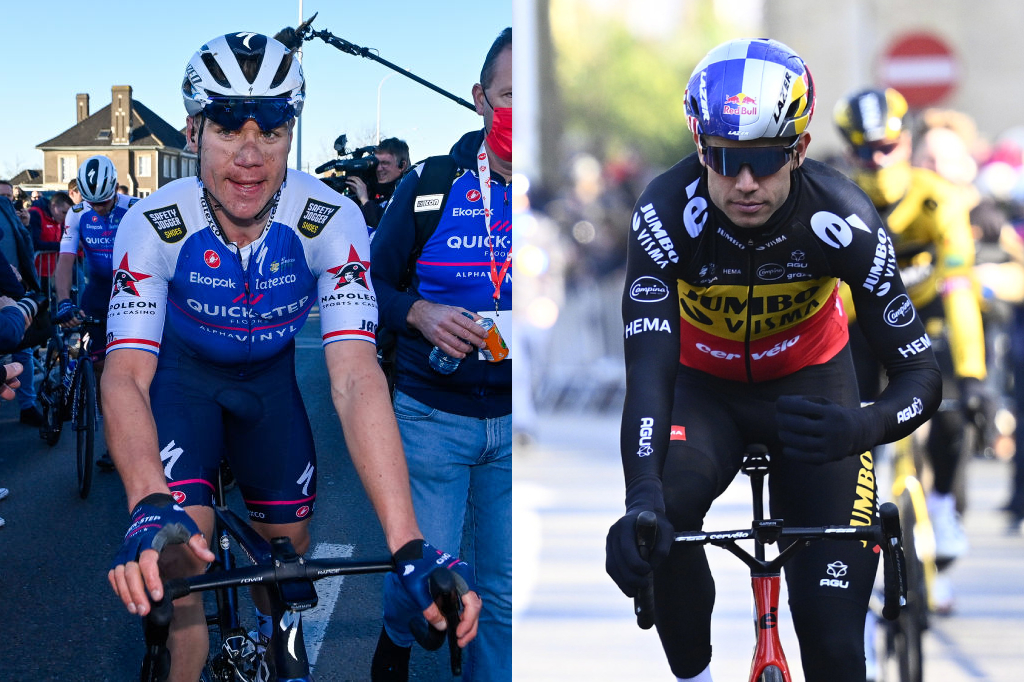
Kuurne-Brussel-Kuurne winner Fabio Jakobsen put it best when he spoke about the Russian invasion of Ukraine after his post-race press conference: "Here, it's 25-year-old guys fighting on a bike for a win and there, it's the 25-year-old guys like me fighting for freedom and their life."
The Dutchman followed Omloop Het Nieuwsblad winner Wout van Aert in taking time out of celebrating his personal triumph to reflect on the ongoing war, the Belgian noting that: "Bike racing is the most important side issue in the world, with the emphasis on 'side issue'. It's just madness that a war is still possible today, and so close."
Though the Opening Weekend is an important early season staging post, the races take the place of a minor footnote in the context of the wider Classics season. This year, it was the reality outside of pro cycling which made the action seem of further inconsequence.
It was former NBA star Charles Barkley who once said: "I am not a role model", a statement that applies to athletes across the sporting world – including pro cycling – a place where declarations on weighty subjects such as climate change, war, and racism are often few and far between.
Recent exceptions in the men's peloton include Kévin Reza speaking extensively about racism, Michael Woods pushing the UCI and his teams to take action on climate change, and Tao Geoghegan Hart saying last year that "everything is political", though the platform of those in the peloton to inspire change is used sparingly.
Those statements from Jakobsen and Van Aert, then, are welcome – a reminder of the difficulties currently endured by those elsewhere. Bike racing, and the entertainment it brings, are brief but gratifying distractions from the hard details of reality, but that reality doesn't go away, after all. (DO)
Dani Ostanek is Senior News Writer at Cyclingnews, having joined in 2017 as a freelance contributor and later being hired full-time. Before joining the team, she had written for numerous major publications in the cycling world, including CyclingWeekly and Rouleur. She writes and edits at Cyclingnews as well as running newsletter, social media, and how to watch campaigns.
Dani has reported from the world's top races, including the Tour de France, Road World Championships, and the spring Classics. She has interviewed many of the sport's biggest stars, including Mathieu van der Poel, Demi Vollering, and Remco Evenepoel, and her favourite races are the Giro d'Italia, Strade Bianche and Paris-Roubaix.
Season highlights from 2024 include reporting from Paris-Roubaix – 'Unless I'm in an ambulance, I'm finishing this race' – Cyrus Monk, the last man home at Paris-Roubaix – and the Tour de France – 'Disbelief', gratitude, and family – Mark Cavendish celebrates a record-breaking Tour de France sprint win.